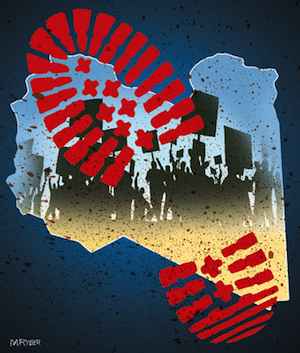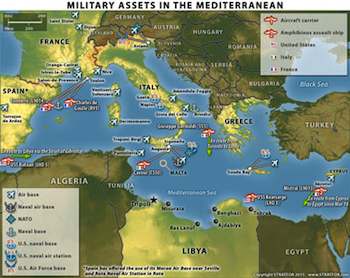- MENU
- HOME
- SEARCH
- WORLD
- MAIN
- AFRICA
- ASIA
- BALKANS
- EUROPE
- LATIN AMERICA
- MIDDLE EAST
- United Kingdom
- United States
- Argentina
- Australia
- Austria
- Benelux
- Brazil
- Canada
- China
- France
- Germany
- Greece
- Hungary
- India
- Indonesia
- Ireland
- Israel
- Italy
- Japan
- Korea
- Mexico
- New Zealand
- Pakistan
- Philippines
- Poland
- Russia
- South Africa
- Spain
- Taiwan
- Turkey
- USA
- BUSINESS
- WEALTH
- STOCKS
- TECH
- HEALTH
- LIFESTYLE
- ENTERTAINMENT
- SPORTS
- RSS
- iHaveNet.com
By George Friedman

The Libyan war has now begun.
It pits a coalition of European powers plus the United States, a handful of Arab states and rebels in Libya against the Libyan government.
The long-term goal, unspoken but well understood, is regime change — displacing the government of Libyan leader Moammar Gadhafi and replacing it with a new regime built around the rebels.
The mission is clearer than the strategy, and that strategy can’t be figured out from the first moves. The strategy might be the imposition of a no-fly zone, the imposition of a no-fly zone and attacks against Libya’s command-and-control centers, or these two plus direct ground attacks on Gadhafi’s forces. These could also be combined with an invasion and occupation of Libya.
The question, therefore, is not the mission but the strategy to be pursued. How far is the coalition, or at least some of its members, prepared to go to effect regime change and manage the consequences following regime change? How many resources are they prepared to provide and how long are they prepared to fight? It should be remembered that in Iraq and Afghanistan the occupation became the heart of the war, and regime change was merely the opening act. It is possible that the coalition partners haven’t decided on the strategy yet, or may not be in agreement. Let’s therefore consider the first phases of the war, regardless of how far they are prepared to go in pursuit of the mission.
Like previous wars since 1991, this war began with a very public buildup in which the coalition partners negotiated the basic framework, sought international support and authorization from multinational organizations and mobilized forces. This was done quite publicly because the cost of secrecy (time and possible failure) was not worth what was to be gained: surprise. Surprise matters when the enemy can mobilize resistance. Gadhafi was trapped and has limited military capabilities, so secrecy was unnecessary.
While all this was going on and before final decisions were made, special operations forces were inserted in Libya on two missions. First, to make contact with insurgent forces to prepare them for coming events, create channels of communications and logistics and create a post-war political framework. The second purpose was to identify targets for attack and conduct reconnaissance of those targets that provided as up-to-date information as possible. This, combined with air and space reconnaissance, served as the foundations of the war. We know British SAS operators were in Libya and suspect other countries’ special operations forces and intelligence services were also operating there.
War commences with two sets of attacks.
The first attacks are decapitation attacks designed to destroy or isolate the national command structure. These may also include strikes designed to kill leaders such as Gadhafi and his sons or other senior leaders. These attacks depend on specific intelligence on facilities, including communications, planning and so on along with detailed information on the location of the leadership. Attacks on buildings are carried out from the air but not particularly with cruise missile because they are especially accurate if the targets are slow, and buildings aren’t going anywhere.
At the same time, aircraft are orbiting out of range of air defenses awaiting information on more mobile targets and if such is forthcoming, they come into range and fire appropriate munitions at the target. The type of aircraft used depends on the robustness of the air defenses, the time available prior to attack and the munitions needed. They can range from conventional fighters or stealth strategic aircraft like the U.S. B-2 bomber (if the United States authorized its use). Special operations forces might be on the ground painting the target for laser-guided munitions, which are highly accurate but require illumination.

Military Assets in the Mediterranean
At the same time these attacks are under way, attacks on airfields, fuel storage depots and the like are being targeted to ground the Libyan air force.
Air or cruise missile attacks are also being carried out on radars of large and immobile surface-to-air (SAM) missile sites. Simultaneously, “wild weasel” aircraft — aircraft configured for the suppression of enemy air defenses — will be on patrol for more mobile SAM systems to locate and destroy.
This becomes a critical part of the conflict.
Being mobile, detecting these weapons systems on the ground is complex. They engage when they want to, depending on visual perception of opportunities. Therefore the total elimination of anti-missile systems is in part up to the Libyans. Between mobile systems and man-portable air-defense missiles, the threat to allied aircraft can persist for quite a while even if Gadhafi’s forces might have difficulty shooting anything down.
This is the part that the United States in particular and the West in general is extremely good at. But it is the beginning of the war. Gadhafi’s primary capabilities are conventional armor and particularly artillery. Destroying his air force and isolating his forces will not by itself win the war. The war is on the ground. The question is the motivation of his troops: If they perceive that surrender is unacceptable or personally catastrophic, they may continue to fight. At that point the coalition must decide if it intends to engage and destroy Gadhafi’s ground forces from the air. This can be done, but it is never a foregone conclusion that it will work. Moreover, this is the phase at which civilian casualties begin to mount. It is a paradox of warfare instigated to end human suffering that the means of achieving this can sometimes impose substantial human suffering itself. This is not merely a theoretical statement. It is at this point at which supporters of the war who want to end suffering may turn on the political leaders for not ending suffering without cost. It should be remembered that Saddam Hussein was loathed universally but those who loathed him were frequently not willing to impose the price of overthrowing him. The Europeans in particular are sensitive to this issue.
The question then becomes the extent to which this remains an air operation, as Kosovo was, or becomes a ground operation. Kosovo is the ideal, but Gadhafi is not Slobodan Milosevic and he may not feel he has anywhere to go if he surrenders. For him the fight may be existential, whereas for Milosevic it was not. He and his followers may resist. This is the great unknown. The choice here is to maintain air operations for an extended period of time without clear results, or invade. This raises the question of whose troops would invade. Egypt appears ready but there is long animosity between the two countries, and its actions might not be viewed as liberation. The Europeans could do so. It is difficult to imagine Obama adopting a third war in Muslim world as his own. This is where the coalition is really tested.
If there is an invasion, it is likely to succeed. The question then becomes whether Gadhafi’s forces move into opposition and insurgency. This again depends on morale but also on behavior. The Americans forced an insurgency in Iraq by putting the Baathists into an untenable position. In Afghanistan the Taliban gave up formal power without having been decisively defeated. They regrouped, reformed and returned. It is not known to us what Gadhafi can do or not do. It is clear that it is the major unknown.
The problem in Iraq was not the special operations forces. It was not in the decapitation strikes or suppression of enemy air defenses. It was not in the defeat of the Iraqi army on the ground. It was in the occupation, when the enemy reformed and imposed an insurgency on the United States that it found extraordinarily difficult to deal with.
Therefore the successes of the coming day will tell us nothing. Even if Gadhafi surrenders or is killed, even if no invasion is necessary save a small occupation force to aid the insurgents, the possibility of an insurgency is there. We will not know if there will be an insurgency until after it begins. Therefore, the only thing that would be surprising about this phase of the operation is if it failed.
The decision has been made that the mission is regime change in Libya. The strategic sequence is the routine buildup to war since 1991, this time with a heavier European component. The early days will go extremely well but will not define whether or not the war is successful. The test will come if a war designed to stop human suffering begins to inflict human suffering. That is when the difficult political decisions have to be made and when we will find out whether the strategy, the mission and the political will fully match up.
Available at Amazon.com:
Aftermath: Following the Bloodshed of America's Wars in the Muslim World
Displacement and Dispossession in the Modern Middle East (The Contemporary Middle East)
The End of History and the Last Man
The Clash of Civilizations and the Remaking of World Order
The Tragedy of Great Power Politics
The End of the Free Market: Who Wins the War Between States and Corporations?
Running Out of Water: The Looming Crisis and Solutions to Conserve Our Most Precious Resource
Bottled and Sold: The Story Behind Our Obsession with Bottled Water
Water: The Epic Struggle for Wealth, Power, and Civilization
At War with the Weather: Managing Large-Scale Risks in a New Era of Catastrophes
Friendly Fire: Losing Friends and Making Enemies in the Anti-American Century
Dining With al-Qaeda: Three Decades Exploring the Many Worlds of the Middle East
Uprising: Will Emerging Markets Shape or Shake the World Economy
Copyright ©, STRATFOR
WORLD |
AFRICA |
ASIA |
EUROPE |
LATIN AMERICA |
MIDDLE EAST |
UNITED STATES |
ECONOMICS |
EDUCATION |
ENVIRONMENT |
FOREIGN POLICY |
POLITICS
World - The Libyan War of 2011 | Global Viewpoint